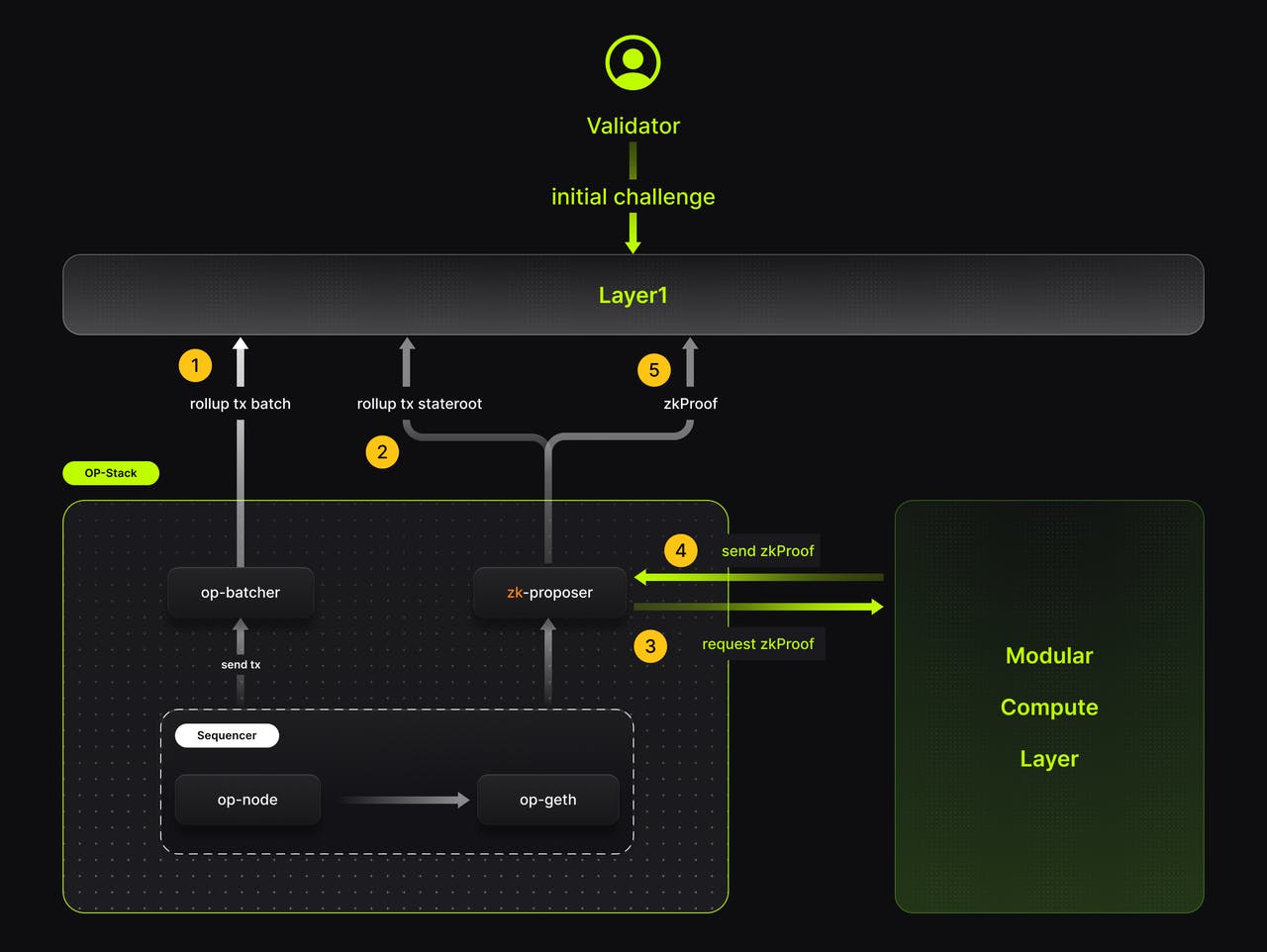
2024-10-22 04:28:13 Author: hackernoon.com(查看原文) 阅读量:2 收藏
Abstract: This article highlights Lumoz’s breakthrough in combining OP Stack with ZK Proof, enhancing performance and security. The new zk-proposer simplifies integration, reduces maintenance, and ensures network stability. The upgrade syncs on-chain data with proofs, optimizes contracts, and eliminates vulnerabilities. Lumoz’s innovation lowers verification latency and costs, enabling seamless OP-Stack to zk-Verifier transitions and reinforcing its leadership in blockchain scalability.
Lumoz is driving blockchain scalability forward by optimizing the integration of OP Stack and ZK technology. Its latest solution combines the flexibility of OP with the robust security of ZK, accelerating network validation while enhancing compatibility with Ethereum and other blockchains.
Lumoz not only provides computing power for this architecture but also introduces innovative optimizations that simplify the integration of ZK-Fraud Proof, making the technology more efficient, secure, and easier to maintain.
The integration of OP Stack and ZK modifies the fraud-proof verification process originally based on OP Stack's optimistic consensus by replacing interactive fraud challenges with non-interactive ZK proofs. In the OP Stack + ZK solution, the roles of the op-batcher and op-proposer remain the same, submitting transaction data and state roots from the Rollup to Layer 1. What’s new is the introduction of a ZK Fraud Proof module, which synchronizes and executes Rollup states and data in real-time.
When needed, it generates corresponding proofs and submits them to Layer 1 for validation, significantly reducing the time required for validity verification. However, this enhanced architecture is more complex and requires specialized maintenance of ZK-Verifier nodes by participants to ensure proper operation.
Lumoz's latest optimization improves the original architecture by integrating the entire ZK-Fraud Proof module into the op-proposer component, upgrading it to a zk-proposer. This significantly reduces the complexity of node maintenance. In the new design, the zk-proposer retains its original functions while adding a ZK interaction option.
This option allows the proposer to request proof generation from the computational network layer based on the execution results of on-chain data and submit the generated proof to the chain for validation.

As shown in the diagram, this design allows any OP-Stack full node to leverage native OP-Stack components to quickly convert into a zk-Verifier node and participate in the network's validation process without incurring additional maintenance costs. Furthermore, since the Layer 1 contract protocol remains unchanged, the existing zk-Verifier nodes can continue providing validation services, ensuring the network’s continuity and stability.
The new solution also optimizes the logic of the validation contract to better protect the consistency between contract data and off-chain states. In the previous architecture, since the proof process only verified the block height on Layer 2, there was a risk of discrepancies between the proof and the actual on-chain data, posing potential security risks.
By adding a check for the preceding batch’s state root within the contract’s validation logic, the new solution ensures that each proof is generated based on the correct and latest state root. This design tightly links the proof generation and validation processes with the real-time state of on-chain data, significantly enhancing the network’s security and reliability.

As shown in the diagram, after each batch is submitted on-chain, the proposer sequentially records the corresponding state root of the batch into a specific array. Whenever a proof needs to be submitted for contract validation, the proposer simultaneously provides the contract with the state roots of both the corresponding batch and the preceding batch. Only after verifying the continuity of the state roots will the Verifier contract proceed with the proof validation.
Lumoz is also exploring additional possibilities for the integration of OP Stack with ZK technology. In the current design, the network’s trust relies on optimistic assumptions, meaning that its security depends heavily on challengers continuously reviewing and challenging transactions to ensure their validity. Compared to ZK-Rollups, which use validity proofs, there is still room for security improvements.
With this in mind, Lumoz is experimenting with simulating correct state transitions within verifier nodes and providing ZK-based validity proofs for every state change interval. Similar to ZK-Rollups, these proofs will serve as direct evidence of state validity on-chain, eliminating the need for interactive challenges by external participants. This approach allows the network to significantly enhance its overall security with minimal computational costs while keeping the existing service architecture largely unchanged.
Lumoz's optimized architecture combining OP Stack and ZK marks a significant advancement in blockchain innovation, striking a perfect balance between speed, security, and simplicity.
By replacing the traditional challenge mechanism with non-interactive ZK proofs, Lumoz has achieved faster, more reliable transaction verification and a seamless validation process. In addition to enhancing scalability, the network's trust model has also been improved, reducing reliance on interactive challenges and paving the way for more efficient and proactive security solutions in the future.
Conclusion
As Lumoz continues to optimize this architecture and explore further possibilities, it is committed to empowering users and partners through reliable, scalable blockchain solutions. This innovation of OP Stack combined with ZK is just the beginning; Lumoz's technological advancements are paving the way for a new chapter in decentralized innovation. Stay tuned to witness the next steps in blockchain evolution — the future driven by Lumoz!
如有侵权请联系:admin#unsafe.sh